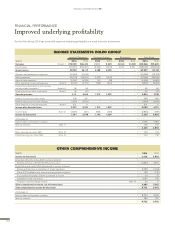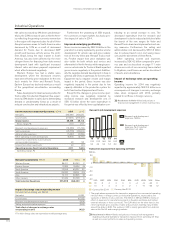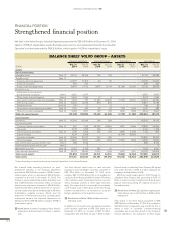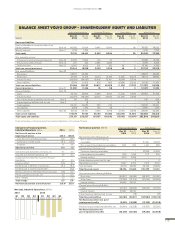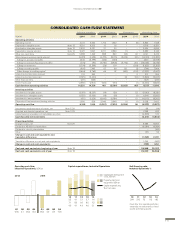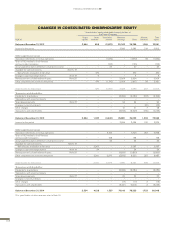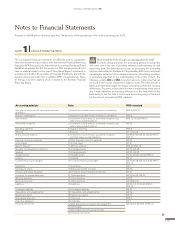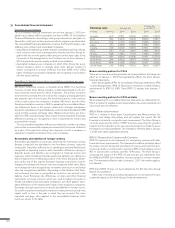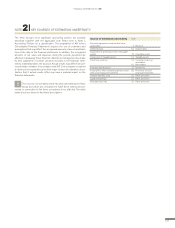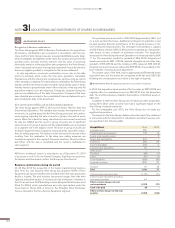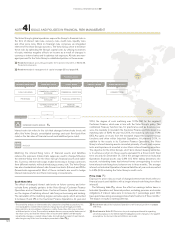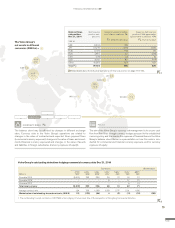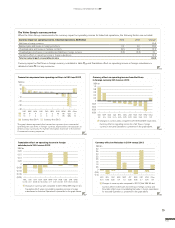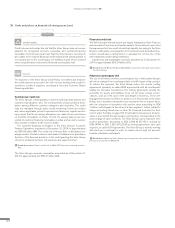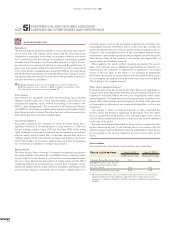Volvo 2014 Annual Report Download - page 124
Download and view the complete annual report
Please find page 124 of the 2014 Volvo annual report below. You can navigate through the pages in the report by either clicking on the pages listed below, or by using the keyword search tool below to find specific information within the annual report.
Consolidated fi nancial statements
Principles for consolidation
The consolidated fi nancial statements are as from January 1, 2013 pre-
pared in accordance with the principles set forth in IFRS 10 Consolidated
Financial Statements. Accordingly, intra-group transactions and gains on
transactions with joint ventures and associated companies are eliminated.
The consolidated fi nancial statements comprise the Parent Company, sub-
sidiaries, joint ventures and associated companies.
– Subsidiaries are defi ned as entities that are controlled by the Volvo Group.
– Joint ventures refer to joint arrangements whereby the Volvo Group to -
gether with one or more parties that have joint control, have rights to the
net assets of the arrangements. Joint ventures are as from January 1,
2013 recognized using the equity method of consolidation.
– Associated companies are companies in which Volvo Group has a sig-
nifi cant infl uence, which is normally when Volvo Group’s holding of
shares correspond to at least 20% but less than 50% of the voting
rights. Holdings in associated companies are recognized in accordance
with the equity method.
Translation to Swedish kronor when consolidating companies are using
foreign currencies
AB Volvo’s functional currency is Swedish krona (SEK). The functional
currency of each Volvo Group company is determined based on the pri-
mary economic environment in which it operates. The primary economic
environment is normally the one in which the company primarily generates
and expends cash. In most cases, the functional currency is the currency
of the country where the company is located. AB Volvo’s and the Volvo
Group’s presentation currency is SEK. In preparing the consolidated fi nan-
cial statements, items in the income statements of foreign subsidiaries
(except for subsidiaries in hyperinfl ationary economies) are translated to SEK
using monthly average exchange rates. Balance-sheet items are trans-
lated into SEK using exchange rates at year-end (closing rate). Exchange
differences arising, are recognized in other comprehensive income and
accumulated in equity.
The accumulated translation differences related to a certain subsidiary,
joint venture or associated company are reversed to the income statement
as a part of the gain/loss arising from disposal of such a company or
repayment of capital contribution from such a company.
Receivables and liabilities in foreign currency
Receivables and liabilities in currencies other than the functional currency
(foreign currencies) are translated to the functional currency using the
closing rate. Translation differences on operating assets and liabilities are
recognized in operating income, while translation differences arising in
fi nancial assets and liabilities are recognized in fi nancial income and
expenses. Interest-bearing fi nancial assets and liabilities are defi ned as
items included in the net fi nancial position of the Volvo Group (see Defi ni-
tions at the end of this report). Derivative fi nancial instruments used for
hedging of exchange and interest risks are recognized at fair value. Gains
on exchange rates are recognized as receivables and losses on exchange
rates are recognized as liabilities. Depending on the lifetime of the fi nan-
cial instrument, the item is recognized as current or non-current in the
balance sheet. Exchange rate differences on loans and other fi nancial
instruments in foreign currency, which are used to hedge net assets in
foreign subsidiaries and associated companies, are offset against trans-
lation differences in the shareholders’ equity of the respective companies.
Exchange-rate gains and losses on assets and liabilities in foreign curren-
cies, both on payments during the year and on measurements at year-end,
impact profi t or loss in the year in which they are incurred. The more
important exchange rates applied in the consolidated fi nancial state-
ments are shown in the table.
Exchange rates Average rate Closing rate
as of Dec 31
Country Currency 2014 2013 2014 2013
Australia AUD 6.1801 6.3046 6.3746 5.7592
Brazil BRL 2.9202 3.0308 2.8903 2.7821
Euro Zone EUR 9.1059 8.6586 9.5248 8.9523
Japan JPY 0.0649 0.0669 0.0654 0.0619
Canada CAD 6.2122 6.3294 6.7231 6.0755
China CNY 1.1134 1.0573 1.2595 1.0732
Norway NOK 1.0904 1.1105 1.0526 1.0590
Great Britain GBP 11.2976 10.1926 12.1451 10.7392
South Africa ZAR 0.6320 0.6773 0.6722 0.6213
South Korea KRW 0.0065 0.0060 0.0071 0.0062
United States USD 6.8582 6.5153 7.8130 6.5097
New accounting policies for 2014
There are no new accounting principles and interpretations that came into
effect as of January 1, 2014 that signifi cantly effects the Volvo Group’s
fi nancial statements.
Volvo Group applied IFRS 10 Consolidated Financial Statements, IFRS
11 Joint Arrangements, IFRS 12 Disclosure of Interests in Other Entities,
amendments to IFRS 10, IFRS 11 and IFRS 12 already from January 1,
2013.
New accounting policies for 2015 and later
When preparing the consolidated fi nancial statements as of December 31,
2014, a number of standards and interpretations has been published, but
has not yet become effective.
IFRS 9 Financial instruments
IFRS 9 is divided in three parts: Classifi cation and Measurement, Im -
pairment and Hedge Accounting, and will replace the current IAS 39
Financial instruments: recognition and measurement. The Volvo Group is
currently assessing the effect of IFRS 9 and are expecting the greatest
impact from the transition to the new expected credit loss model, however
the impact is not yet quantifi able. The mandatory effective date is January
1, 2018, with earlier application allowed.
IFRS 15 Revenue from Contracts with Customers
IFRS 15 represent a new framework for recognising revenue with addi-
tional disclosure requirements. The framework establish principles about
the nature, amount, timing and uncertainty of revenue and cash fl ow aris-
ing from an entity’s contracts with customers. IFRS 15 will replace current
IAS 11 Construction contracts and IAS 18 Revenue. The Volvo Group is
assessing the impact of the IFRS 15 and monitors any statements from
the IASB and FASB Joint transition resource group for revenue recogni-
tion. The mandatory effective date is January 1, 2017, with earlier applica-
tion allowed.
IFRS 9 and IFRS 15 have not been adopted by the EU when this Annual
Report was published.
Other new or revised accounting standards are not considered to have
a material impact on the Volvo Group’s fi nancial statements.
FINANCIAL INFORMATION 2014
120


